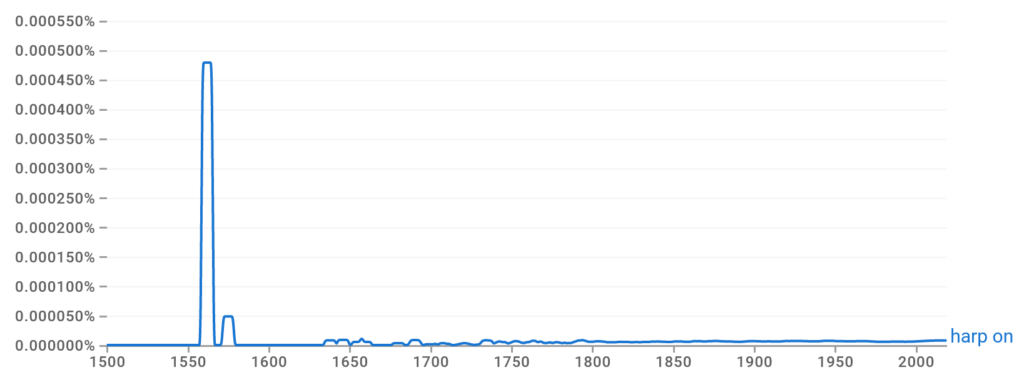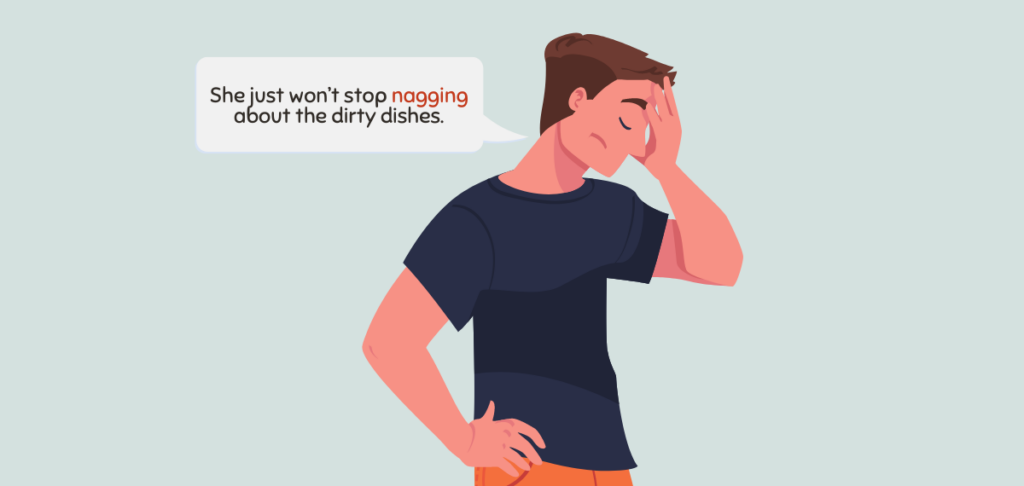To harp on is an idiom that means to heavily nag or constantly remind someone about a single subject. This phrase encapsulates the act of dwelling persistently on one thing, usually in an unwelcome way.
Idioms, like harp on, are expressions whose meaning cannot be easily understood from the literal meaning of the words they contain. Their ability to convey complex meanings in a concise and culturally resonant way makes idioms essential to the English language.
Like most idioms, this metaphorical expression is a staple in English, highlighting our tendency to fixate on particular issues. However, it only works if used properly. So, in this article, I’ll dive into the depths of this phrase’s meaning, origin, and usage and share some variations, related terms, and examples of its use. Let’s go!
What Does the Idiom Harp on Mean?
The idiom harp on means to persistently and repeatedly talk about or emphasize a particular subject, often to the point of becoming tedious or annoying to others. We use it to let others know when they’re being way too pushy or irritating about something to the point of badgering.
According to Merriam-Webster, the definition of harp on is “to talk about (a subject) constantly or repeatedly in an annoying way.” Similarly, Collins Dictionary states that if you say that someone harps on something, or harps on about it, you mean that they keep on talking about it in a way that other people find annoying.
Sometimes, it can’t be helped, though, especially when someone is excited about something. For instance, while waiting for my designer to complete the latest book cover design, I incessantly nag him with emails, texts, and gentle nudges, all inquiring about a sneak peek at the progress. But this is an example of the idiom being used in a positive way. Or, at least, it comes from a positive place of excitement.
In the negative (and more common) sense, I can’t help but think of a teenager constantly being plagued by his mother to clean their bedroom. We see this in movies and TV shows all the time, but I live it every day. My son is a neat freak (thank goodness), but my daughter is a chaotic, messy, creative individual who refuses to clean her room, which is full of art supplies and musical instruments. Every time I ask, all I get is, “Stop harping on me all the time, Mom!” in response.
Literal Meaning vs. Figurative Meaning
The literal meaning of harp on is all about an actual harp, specifically when someone plucks a single string over and over. Annoying, right? That’s where the figurative sense comes into play to describe someone repeatedly annoying you about something.
Variations of the Idiom
These variations convey the sense of persistent repetition, often to the listener’s annoyance, but are used based on the timeframe of the context.
- Harping on (present continuous tense)
- Harped on (past tense)
- Harps on (simple present tense)
How Is Harp on Commonly Used in Context?
The idiom harp on is frequently employed to describe the act of persistently focusing on or repeatedly discussing a particular subject, often to the point of becoming tiresome. This expression captures the notion of continuous emphasis or insistence on a topic. To explore its usage more comprehensively, the following sections provide valuable insights:
What Are the Different Ways to Use Harp On?
- In personal conversations: When someone keeps revisiting a particular grievance or topic that no one wants to talk about. “Oh, my gosh, Kelly. Stop harping on about that time when Taylor Swift wouldn’t take a selfie with you.”
- In debates: To highlight an opponent’s focus on a single, perhaps inconsequential, point. “While I prefer to take feedback from the audience, my opponent continues to harp on me about my personal life.”
- Expressing annoyance: To let someone know that they’re pressing you too much. “I appreciate your drive to get this project done, but you’re constantly harping on me about the deadline, and it’s affecting my ability to focus.”
What Are Some Tips for Using Harp on Effectively?
- Use it to express annoyance with someone’s continual focus on a single subject.
- Be aware of its somewhat negative connotation—it implies a lack of willingness to move on or let go. This might come across as cold and uncaring.
- It can be used humorously to lighten the mood when someone is fixating on something trivial.
Where Can You Find Examples of Harp On?
You can find examples of the idiom harp on in literature, movies, and everyday conversations, usually in contexts where someone’s criticized for their inability to move past a particular point.
There aren’t any significant examples of it used in the titles of books or movies that I can find. However, it is being used in media all the time, like these examples:
Coaches and players have been careful not to harp on last year, which ended with zero wins against SEC opponents and the firing of coach Butch Jones. (The Daily Times)
Most curious of all was a column in Shukan Shincho (Aug. 30), one of the higher quality weeklies that does not habitually harp on conspiracy theories, even when they involve a belligerent nation. (The Japan Times)
What Is the Origin of the Idiom Harp On?
The idiom harp on originated from the repetitive nature of playing certain string instruments, like the harp, dating back to the 15th century. The phrase to harp on is an abbreviation of a longer idiom that was once popular but is rarely heard today. The entire idiom is to harp upon one string. The idea is that one has a range of topics to speak about, symbolized by the strings on a harp, but chooses to repetitively return to one topic until the listener is bored or exasperated.
An early use of it in print can be found in the works of John Frith, an English poet, in the early 1500s, “Se how he harpeth all of one stringe.”
But Shakespeare is well-known for having used idioms in his work all the time. This one was mentioned in Hamlet back in 1602, “Still harping on, my daughter?”
How Did the Idiom Evolve Over Time?
It was initially used to describe the persistent repetition in music. However, it somehow evolved into a metaphor for continuously talking or complaining about the same topic today.
What Are Some Related Terms to Harp On?
Understanding the synonyms and antonyms for a certain word or phrase can help us understand it even better.
Synonyms
- Dwell on
- Obsess over
- Fixating
- Nag
- Over complain
- Labor the point
Antonyms
- Let go
- Move on
- Bore
- Be vague
- Not care
- Overlook
To Harp On: Test Your Knowledge!
Choose the correct answer.
What Have We Learned About Harp On?
Harp on is a simple and very common idiom that vividly captures the essence of persistently focusing on a single issue, usually to the extreme irritation of others.
We covered so much in this quick guide! By understanding its meaning, usage, and origin, we become better equipped to recognize and perhaps avoid falling into the trap of harping on issues ourselves.
For more helpful info about idiomatic expressions and their impact on communication, spend some time with our other articles!
Check out some others we covered:



